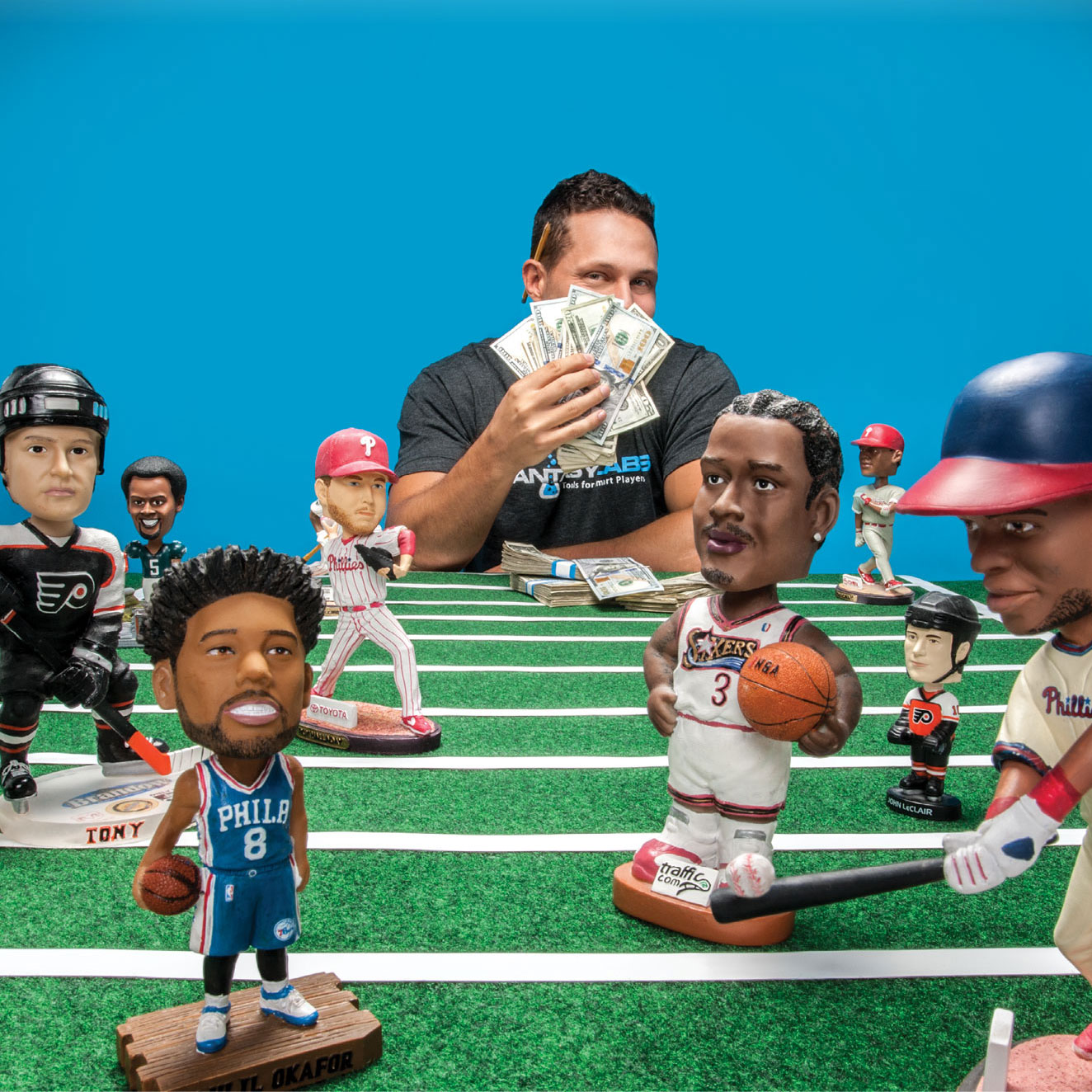Walking through a party at the posh W Hotel in Beverly Hills, California, Jonathan Bales is repeatedly approached by strangers from all over the country. They’ve read his books. They subscribe to his company’s website. They carefully consider every word he puts into the ether. Some practically swoon at the chance to shake his hand.
Related: 5 Ways to Be More Influential
Daily fantasy sports players are, by and large, men between the ages of 25 and 35. Most are keen, smart sports fans and have been since they were kids. The vast majority of them (conservative estimates put it at around 90 percent) lose money. Most of the players here, though—sipping drinks and eating hors d’oeuvres around a neon-lit pool on a warm summer evening—are not among those 90 percent. Almost all of these players are experts who study this topic religiously, staring at numbers and charts for hours, analyzing every variable possible for every minute decision. Many consider themselves pros, playing for thousands of dollars a night. If this were Wall Street, these would be the innovative-but-cutthroat traders movies are made about.
This pool party is a way for the players to meet before the big tournament tomorrow afternoon, where the first-place prize will be $100,000. Because daily fantasy sports exists on the internet, many of the best players in the world have met each other in person only a handful of times. When they greet each other, though, it’s often with the familiarity of longtime friendship. They ask about parents, siblings and significant others. They reminisce about times they competed together in Las Vegas, Miami and Mexico. They downplay the importance of this one-day tournament, noting that the money would be nice, but agreeing that they just like the chance to get together. It might sound like a twisted mind game, like pure facetiousness, but it’s genuine. At a tournament with stakes like these, you might imagine the vibe would be tenser, but here it’s all laughs and smiles. Still, they don’t discuss their lineup picks for tomorrow.
“Amateurs ask who you’re picking all the time,” Bales says. “But never the pros.”

DAVE MOSER
Bales and his closest friends don’t consider one another opposition at all. In fact, they help one another whenever possible. Because they all live in different parts of the country—Bales in Philadelphia; others in Colorado and California—they don’t get together often. They’re also using this weekend in Los Angeles as an extended bachelor party for one of the guys. While most of the tournament participants are staying at the W, Bales and his companions have rented out the pool bungalow at the legendary Chateau Marmont on Sunset Boulevard—paying something in the neighborhood of $10,000 for the weekend.
Tonight Bales wears shorts and a T-shirt with the logo for FantasyLabs—the daily fantasy sports company he co-founded and runs with friends—and a backward ball cap. He’s 30 years old, thickset and muscular, with a catalog-ready smile. At all times he seems relaxed. He’s mostly quiet, but when he does talk, it’s immediately clear he’s the smartest guy in the room, no matter what room he’s in.
When strangers at a meet-and-greet introduce themselves to Bales, they thank him not for simple tips on how to play a game. They thank him for changing the way they think about the world. A tall, broad-chested man from New Jersey approaches Bales and tells him how he started playing, the mistakes he made when he was a beginner, how Bales and his site helped him improve, and how he’s started involving his girlfriend in some of the low-stakes games.
“She’s really getting into it,” the man tells Bales and his friends. “She’s really starting to understand. We’ll sit there and talk about it over dinner now. It’s great. And a lot of it is thanks to you guys.”
Before heading back to the Chateau, Bales’s group makes small talk for a few minutes, then circles the pool to make sure they haven’t missed any food or beverage stations. They explain that in tomorrow’s tournament, they’ll probably see several different strategies deployed, and each might be difficult to predict.
“Having the data is such a small part of this. It’s all about what you decide to do with it.”
“Having the data is such a small part of this,” Bales says. “It’s all about what you decide to do with it.”
What Bales decides to do with the data over the next 24 hours will determine whether he leaves California $100,000 richer.
***
If you’ve watched football, baseball or basketball in the last two years, you’ve probably seen commercials for daily fantasy sites DraftKings and FanDuel. Daily fantasy sports uses essentially the same model as traditional fantasy sports—where participants pick players from different teams, form their own fantasy rosters and accrue points for their players’ statistical performances—but it’s thrown into overdrive.
Think of it like a daily stock portfolio contest, in which players are given a certain amount of money to invest, and whoever picks the stocks that perform the best that day wins. Except instead of stocks, they pick players in various sports. (The tournament in Los Angeles is a baseball tournament.)
Entry into a tournament can cost anywhere from 25 cents to $10,000, and some players enter multiple teams to increase their chances of winning. The buy-in for this tournament costs $10,000. Sometimes a tournament pits 15 people against one another, and sometimes it’s 15,000. Payouts range from hundreds to millions, with the hosting sites keeping about 10 percent of the total pot.

DAVE MOSER
This means the best fantasy players—the 1.3 percent who reportedly take home 91 percent of the winnings—know everything about every real player on every real team in every major sport. They use complex predictive algorithms to model all manner of statistics. Some fantasy players—game theory specialists—don’t know much about the actual sports themselves. They can’t tell you how many sets are in a tennis match or who Joe Montana is, but they know numbers and probability. Each moment of every game is translated into data—yards, innings, 3-pointers, and so on. That data is translated into fantasy points. And if you have enough points, they translate into money.
There’s no way to know exactly how many people play daily fantasy sports, but an estimated 57 million North Americans participated in some capacity last year, and the two biggest daily fantasy sports companies are each valued in excess of $1 billion. Investors include Fox Sports, NBC Sports, Time Warner and Google.
Much like in the world of finance, the jargon and complexity of daily fantasy sports can make a conversation sound like gibberish to an outsider. Some of the terms—such as fish and shark—were carried over from poker. (A fish is a newbie, and a shark is the expert who will take that newbie’s money.) A player who has just lost and is making bad decisions as a result is said to be “on tilt.” The exponential growth of daily fantasy sports came around the same time as the decline in popularity of online poker, and a lot of top daily fantasy players were also top poker players.
You might hear a fantasy player say he is “stacking” a team, which is when someone picks several players from the same team and hopes that team has a really good day, or “fading” a team, which means the opposite—not playing anyone from that team. Some players like the rush, that moment the results come in and the sheer anticipation starts releasing chemicals in their brain. Other players, like Bales, don’t like watching the results come in.
“I don’t like to sweat,” he says in the verbiage of daily fantasy.
There’s an ongoing debate in state legislatures and courtrooms over whether daily fantasy sports is gambling, and whether it is (or should be) legal and regulated. Advocates make the same arguments poker players have made for years. They point out that it’s often some of the same pros near the top of the scoreboard in big tournaments, and they call daily fantasy a game of skill. On the other hand, it’s still people winning or losing money based on the outcome of a sporting event, which sounds a lot like gambling.
“It’s gambling the way anything in life is gambling. Every single thing you do in life, there’s some risk and there’s some reward.”
“It’s gambling the way anything in life is gambling,” Bales says. “Every single thing you do in life, there’s some risk and there’s some reward.”
***
This is how Bales thinks. He studied philosophy at Muhlenberg College in Pennsylvania, where his senior paper argued that reality as we know it is probably a simulation. (Tesla Motors CEO Elon Musk recently said something similar at a Code Conference.) Though Bales lives in Philadelphia Eagles territory, he’s always been a big Dallas Cowboys fan. That’s perhaps the only team he really roots for in real life, he says. After college, he started analyzing Cowboys games, breaking each play into 50 different variables—“for fun.” Then he’d email his analysis to every person in the Cowboys front office.
Soon he had jobs blogging for various outlets, including the Dallas Cowboys website, writing thousands and thousands of words of analysis all day, every day. “I knew I couldn’t maintain that output for very long,” he says.
Around that time he started playing daily fantasy football. It combined his love of statistical analysis with his philosophical affinity for game theory. Bales didn’t get into online poker early enough in the international craze—when some of his friends won a lot of money—and regretted missing out. Before most people in America had heard of daily fantasy sports, Bales was studying it with his own particularly sober brand of rationality.
He looked at how statistical categories were weighted and how the payouts were structured in various tournaments. He realized his goal was not just to score the most points in these big battles royal, but to score points that other people aren’t scoring. That sounds intuitive, but it’s not. Some athletes will, by virtue of their previous performances, be favored to score more points and appear in more lineups—but if you have the same pick as someone else, you both get the same points and neither of you is any closer to winning. You want athletes who perform better than your opponents expect.
To use a quick poker analogy: a pair of kings is, generally speaking, a better starting hand than a suited eight and nine because a pair of kings is more likely to win a hand. But if you have a suited eight-nine, and it happens to turn into a straight or a flush, you’re likely to win a bigger, more lucrative hand.
This way of thinking has made Bales millions of dollars over the last few years. It’s also made him an authority on fantasy sports. He’s parlayed that success into other ventures. Every year, for every sport, he publishes a new book of insights, with titles like Fantasy Football for Smart People. He and his friends also founded FantasyLabs, which not only provides the most up-to-date roster information, but also gives users an interface to model and analyze any number of different statistics. (It means most of his days are spent staring at numbers scrolling across several computer monitors.)

DAVE MOSER
At the beginning of the last two football seasons, there was a deluge of TV commercials for daily fantasy sports. That resulted in a swell of players, which meant more fish and also more players looking for an edge. At one point, Bales says FantasyLabs was pulling in $220,000 a month. Dallas Mavericks owner and Shark Tank star Mark Cuban invested early on.
“They are super smart in an area that is going to grow quickly,” Cuban says of the FantasyLabs founders. “They are doing really well, and I expect that to continue.”
***
The Chateau Marmont is an iconic Hollywood landmark, filled with a history of celebrities behaving badly. It markets discretion. Led Zeppelin’s drummer once rode his motorcycle through the lobby. Britney Spears and Lindsay Lohan had mild public breakdowns there. It’s where John Belushi overdosed. The entire hotel, built nearly a century ago, is designed to resemble a French chateau. When Bales and his friends—a group of 10, including the bachelor’s younger brother—return from the pool party, there’s a white Rolls-Royce parked near the entrance. The attendants greet the group by name.
Inside the bungalow, the bachelor party begins in earnest. There are red plastic cups and copious toasts to the groom-to-be and the various displays of young men celebrating their friend and their friendships. Word gets out that someone spotted Charlize Theron earlier at the hotel bar, but by the time the group arrives, there are no (recognizable) celebrities in sight.
The Marmont bar has iron chandeliers, pointed archways and exposed wooden beams across the ceiling. Next to the grand piano is a record player and a crate of vinyl albums collected from across the past five decades. The whole place looks like the setting of some classic photograph you can’t quite recall.
Bales sits down at a table away from the crowd and sips on a $22 old-fashioned. Soon he’s talking about how much society underappreciates predictive modeling, the kind he uses to determine which player is likely to do what. Statistical analysis can remove your emotional bias from the equation, he says. A lot of the world can be broken down this way. He explains how some of the top daily fantasy players would make better general managers than many of the actual GMs in pro sports. In some cases, they might make better NFL coaches, too, he says.
“Just look at punting,” Bales says, shaking his head. “If you’re going by the numbers, you’re almost never going to punt. You’re going to go for it on fourth down. Field position is overvalued. You’re also barely going to run it. You’re going to be passing nearly every down.”
The reason NFL coaches don’t abide by these metrics?
“It all comes down to emotion,” Bales says. “They can’t take the emotion out of it. It’s the fear of what people will say if it doesn’t work. So they never try. One day one coach will do it, and not long after that they all will.”
Related: Face Your Fears
He stresses that predictive modeling could be much further-reaching than the realm of sports. The potential uses are limitless, he says. Think about criminal justice, where a court could determine sentencing based on a system that removes human bias. Or think of a medical field in which an algorithm might one day be able to diagnose people more accurately than a doctor with 20 years of experience. It’s all about removing that emotional element.
This worldview means Bales doesn’t get worked up over the results of his daily fantasy decisions, even when the amount of money he’s dealing with would stun most people. He once lost $37,000 in a single weekend.
“At this point, losing $10,000 feels like getting a hamburger at McDonald’s.”
“At this point, losing $10,000 feels like getting a hamburger at McDonald’s,” he says. It’s not to say he thinks of $10,000 as chump change, but instead an acknowledgment of the fact that you’ve got to eat. For Bales and people who see risk in the same way, high stakes are a simple fact of life.
With his approach to daily fantasy sports—getting the points your opponents don’t—he doesn’t win money nearly as often as he loses, at least in tournaments. But when he does win, the windfalls are big, usually more than enough to make up for the losses. But that also means he doesn’t get particularly excited when he wins, either.
Do winning and losing feel the same after a while? They are the same.
Do winning and losing feel the same after a while?
“They are the same,” he says.
If you know the odds and payouts, make value wagers and account for variance, and play the same way, then over a long-enough time, the probabilities play out. And over time, a win today is the same as a loss tomorrow.
Eventually the conversation winds down, and it’s time for bed. Bales has a big day tomorrow.
***
The next morning, professional baseball players wake up all over the country, ready to play. The daily fantasy players wake up and check for any last-minute roster adjustments. By 10 a.m. Bales is looking at weather reports on the East Coast and pulling up radar images on his computer. Large summer storms near a few different ballparks could affect several games.
Weather plays a significant role in daily fantasy sports. Bales has to consider not only how various players performed in certain weather conditions in the past, but also whether the game will take place at all. In baseball, rainouts aren’t rare. But in daily fantasy baseball, if your pitcher doesn’t play today, you don’t get a do-over; you lose out on that opportunity for points. (The fact that you sometimes have to set your lineup before the early games start, even when your players are in the later games that day, further complicates the matter.)

DAVE MOSER
“Sometimes you end up being 80 percent meteorologist,” Bales jokes as he mulls over his difficult choices for the day. He suspects a pitcher on the Houston Astros might be particularly underrated today, but he has a few other options that each come with their own probabilities. With a thunderstorm headed toward Washington on the radar, it looks like the game might be suspended, which could mean he’d have to reconfigure his whole team. He goes with the Houston pitcher. His lineup is locked.
Because all of the decisions are made before any of the action begins, the in-real-life part of the tournament is more of a party. It’s at the Playboy Mansion, a venue many of the players have visited at least once or twice. Walking in still feels surreal, though. There’s the pool, with the famous grotto. There are two bars with complimentary drinks. There’s a game room with a fireplace and old arcade games set to free play. There are peacocks, parrots and monkeys peering out from cages. There are models walking around—many in bathing suits—but the entire party is very PG-13.
After a walk through a small bamboo forest, the group poses for a photo in front of the mansion then heads to the tent where the scoreboard shows the top teams in real time. Usernames bounce on and off the board with the swing of a bat in Chicago, a stolen base in Texas, a strikeout in New York. There are approximately 12 reminders posted in every direction that one of these usernames will leave the party $100,000 richer.
There’s not much suspense for Bales, though. When the lineups are posted, he sees that several other players worked the same strategy as he did—a strategy many of them learned from him. This means that the chances for him to win big today were small before the first pitch was thrown. While it may seem like he’s giving away his secrets, he considers sharing his strategies a form of diversifying his portfolio and building brand equity.
The broad-chested man from New Jersey comes over to Bales in the tent. It’s clear from the expression on his face that he’s off to a bad start. He pulls out his phone to show Bales his lineup. It turns out they both have the Houston pitcher and four or five other players.
Bales smiles.
“I can recognize a FantasyLabs lineup in a second,” he says.
By the time Bales goes over to the lunch tent for sausage and fried chicken, his team is close to the bottom and not rising. He seems totally unfazed. He eats and sips a drink in front of a row of flat screens, each showing a different game. He thinks about it for a second and decides these are the first five minutes of baseball he’s actually watched this season.
“The game itself is so boring,” he says. “It’s so slow.”
He points out that it’s great for daily fantasy, though. With so many statistical categories, so much data, the pros have an even bigger advantage over the novices. He sometimes thinks about those people, too. He’s met men he knew were going to lose money, and that’s a strange feeling. When conversation turns to the fish—the people who often drive the action on these sites—Bales and his friends are all quick to point out the first rule of daily fantasy: Don’t put money in if you can’t afford to lose it. Losing is part of the game.
Just then, a player in Baltimore, down 7-0 late in the game, hits a solo home run. The scoreboard at the ballpark changes to 7-1, but the scoreboard in the tent shifts and ends whatever small chance Bales had left. Still, he seems unfazed. In fact, he’s smiling and joking the same way he was this morning. He walks over to play beanbag toss with his friends, then into the game room to play pool. Soon they’ll head back to the Chateau to continue the bachelor party.
Winning and losing feel the same. But a chance to hang out with his friends on a beautiful weekend in L.A.? That feels good.
Related: Afraid of Risks? How to Be Bolder









